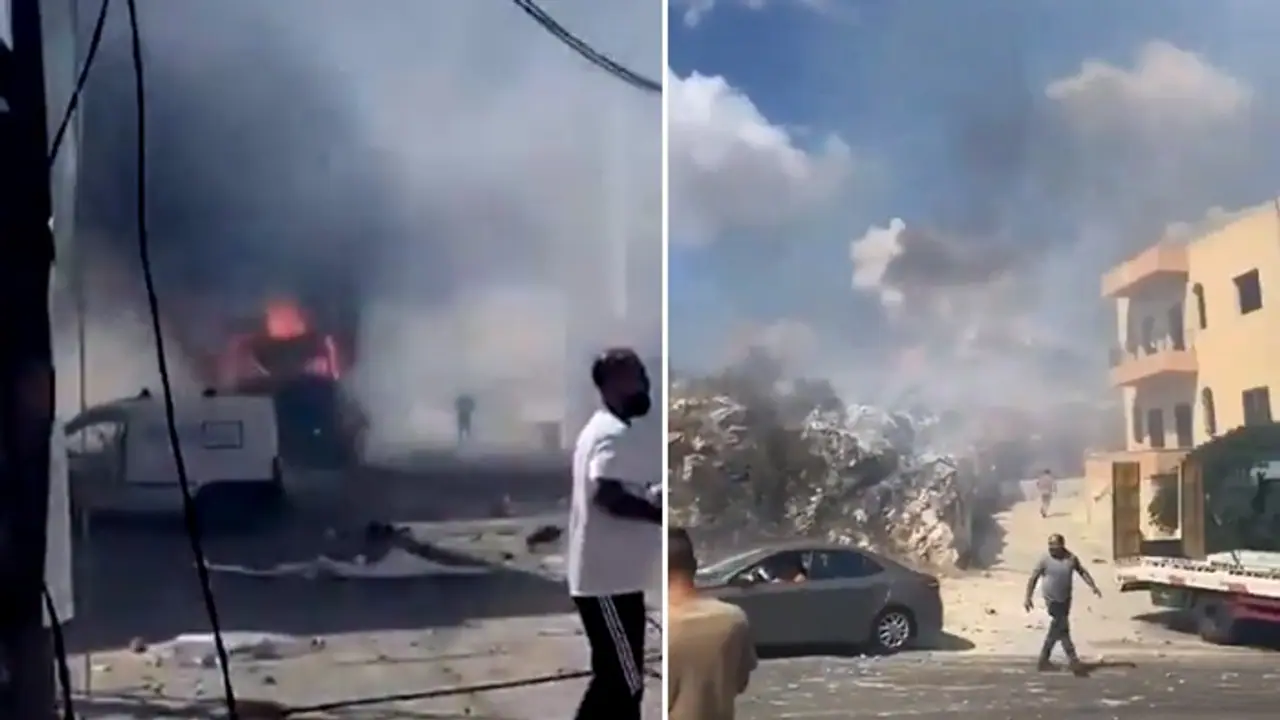The Israeli Defense Forces (IDF) intensified their military campaign against Hezbollah, launching around 300 airstrikes on Hezbollah targets across southern Lebanon on Monday.
The Israeli Defense Forces (IDF) intensified their military campaign against Hezbollah, launching around 300 airstrikes on Hezbollah targets across southern Lebanon on Monday. According to Lebanese media, the barrage of strikes killed at least four Hezbollah militants and injured 28 others, in one of the most aggressive escalations in the ongoing Israel-Hezbollah conflict.

"The Chief of Staff approves the attack on Hezbollah targets in Lebanon in a hole in Kirya. So far, over 300 Hezbollah targets have been attacked," wrote IDF in a statement on X.
The airstrikes, which reportedly hit over 60 villages in the southern region, focused primarily on Hezbollah military positions and weapons storage facilities. Among the reported casualties was one civilian in the eastern region of Lebanon, underscoring the increasing toll on local populations as the conflict intensifies.
Monday’s strikes come against the backdrop of mounting tensions between Israel and Hezbollah, the Iran-backed militant group, as both sides have engaged in a series of escalating attacks. The IDF has accused Hezbollah of stockpiling weapons in civilian areas, embedding its military operations within residential zones, and putting local populations at risk.
Rockets fired into northern Israel
In their response to Israel’s massive wave of airstrikes on Lebanon, Hezbollah reportedly launched at least 25 rockets into northern Israel. The IDF reported that approximately 25 rockets were launched from Lebanon targeting the Safed area. Air defenses intercepted several rockets, while others landed in open areas near the Ami’ad community.
In a separate incident, a projectile fired from Lebanon at the Elkosh area in the Upper Galilee also landed in an open field, according to the IDF.
No further details have been provided regarding the sirens that were activated in the Lower Galilee shortly before these attacks.
An Israeli man in his 50s sustained light injuries from shrapnel during Hezbollah's rocket barrage on the Lower Galilee, according to medics. The Magen David Adom ambulance service reported that the man was struck in the lower extremities. He is fully conscious, in good condition, and is being transported to Poriya Medical Center near Tiberias for treatment.
Meanwhile, Lebanon's health ministry has directed hospitals in the southern and eastern regions to suspend all non-urgent surgeries to prioritize the treatment of those injured in the escalating Israeli airstrikes against Hezbollah.
In an official statement, the ministry urged "all hospitals" in the affected districts to "halt non-essential surgeries to create space for treating the wounded amid the expanding Israeli aggression on Lebanon."
Similarly, Israel’s Health Ministry yesterday instructed hospitals in the northern part of the country to shift patient care to reinforced areas, postponing non-urgent procedures due to the intensifying conflict.
Lebanese Prime Minister Najib Mikati on Monday condemned the intense Israeli airstrikes on Hezbollah targets in eastern and southern Lebanon, describing them as a “destructive plan.”
At a cabinet meeting, Mikati stated, “The continuing Israeli aggression on Lebanon is a war of extermination in every sense of the word and a destructive plan that aims to destroy Lebanese villages and towns."
He called on the United Nations, the General Assembly, and influential nations to take action to deter the Israeli aggression.
Earlier today, IDF spokesperson, Rear Admiral Daniel Hagari, issued an urgent warning to Lebanese civilians, advising them to distance themselves from Hezbollah-operated sites. "We urge civilians in Lebanese villages located near Hezbollah military infrastructure to evacuate immediately for their safety,” Hagari said in a statement posted on X (formerly Twitter).
The warning reflects Israel’s strategic messaging to Lebanese citizens, highlighting the dangers posed by Hezbollah’s practice of using civilian spaces for military purposes.
In a coordinated effort to reach Lebanese civilians, the IDF took control of local Lebanese radio stations to broadcast warnings. Avichay Adraee, the IDF's Arabic spokesperson, directly addressed the people of Lebanon in his radio message. "Hezbollah is sacrificing you for its missiles and drones, placing its military assets above your safety," Adraee stated. The broadcasts emphasized the IDF’s intention to target Hezbollah infrastructure hidden in civilian buildings, urging residents to evacuate immediately.
Monday’s strikes follow a high-profile Israeli bombing raid in Beirut last week, targeting a building where senior Hezbollah commanders were reportedly meeting. Though Hezbollah has not officially commented on the damage or losses, Israeli officials described the operation as an attempt to decapitate Hezbollah’s leadership and reduce the group’s operational efficiency.
Adding to the escalating tensions, a series of mysterious explosions across Lebanon last week killed more than 30 people and injured thousands. These explosions were reportedly linked to Hezbollah’s internal communications devices, including walkie-talkies and pagers, raising concerns of internal sabotage or Israeli covert operations aimed at disrupting Hezbollah’s communication network.
Israeli Prime Minister Benjamin Netanyahu has taken a strong stance on the ongoing military campaign, vowing to continue retaliatory actions against Hezbollah. Speaking on Sunday, Netanyahu warned that Hezbollah had been struck "in ways it could not imagine" and signaled that the Israeli military would continue to escalate if necessary. "If Hezbollah has not understood the message yet, I promise you, it will understand soon," Netanyahu said in a statement on Sunday.
As the conflict nears its 11th month, the humanitarian toll in southern Lebanon continues to rise. Thousands of civilians have been displaced as villages in the region are increasingly caught in the crossfire between Hezbollah and Israeli forces. International organizations have raised alarms about the growing number of civilian casualties and the dire conditions for those forced to flee their homes.
The latest series of airstrikes has brought Israel and Hezbollah closer to an all-out war, with both sides engaged in tit-for-tat attacks. With no end to the violence in sight, the situation remains volatile, threatening to plunge the region into further chaos.
